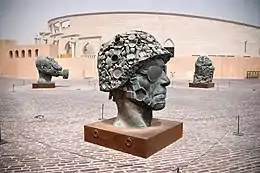Gandhi's Three Monkeys
Gandhi's Three Monkeys is a series of sculptures created by Indian artist Subodh Gupta that portrays three heads in different types of military headgear. The sculptures recall a visual metaphor from India's famous champion of peace, Mahatma Gandhi, of the "Three wise monkeys", representing the principle "see no evil, hear no evil, speak no evil".[1]

Design
The three heads are composed of stainless steel cooking instruments, used pails, traditional Tiffin lunch boxes, and glass bowls.[2] Different elements define each head—each respectively covered by a gas mask, a helmet and pair of glasses, and a hood.[3]
Philosophy
This series of sculptures continues Gupta's inspections of dualities in his artwork, including themes of war and peace, public and private, global and local.[3] The phrase "See no evil, Hear no evil, Speak no evil" first emerged in Japan in the 17th century and was later adopted worldwide as a message of peace and tolerance due to Mahatma Gandhi's visual metaphor of the three monkeys, with one of them covering his eyes, the second his mouth, and the third his ears.[2]
Gupta's sculptures recall Gandhi's vision of these three monkeys as a way to peacefully fight against contemporary colonialism, oppression and injustice.[4]
Location
Since they were created in 2008, the sculptures have toured the world within various exhibitions, such as the "STILL, STEAL, STEEL" show at Jack Shainman gallery (March–April 2008).[4]
Recently, the sculptures were installed permanently in Katara Cultural Village in Doha, Qatar.[5]
See also
References
- "QMA unveils Gandhi's 'Three Monkeys' at Katara". Qatar Tribune. 28 May 2012. Archived from the original on 6 June 2012. Retrieved 21 June 2012.
- Man of Steel Archived 2010-12-25 at the Wayback Machine in Vogue India, February 2009
- "Gandhi's Three Monkeys get a different rendition". The Peninsula. 28 May 2012. Archived from the original on 2 July 2012. Retrieved 21 June 2012.
- SUBODH GUPTA / STILL, STEAL, STEEL
- "Gandhi's Three Monkeys by Subodh Gupta". Archived from the original on 2012-09-03. Retrieved 2012-05-29.